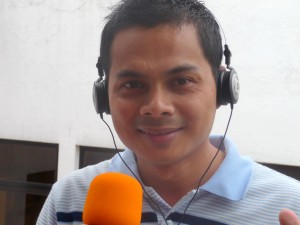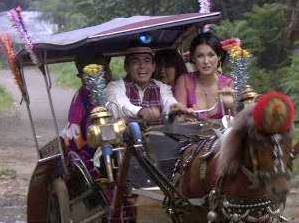Japanese tragedies stir nuclear debate in Indonesia
By Permadi Kencono Wulan
 From Indonesia former DW-AKADEMIE trainee Permadi Kencono Wulan writes that almost all of the country’s media have been covering the events in Japan from the moments they began. Focus has been on memories of the tsunami that happened in Indonesia, the strength and fortitude of the Japanese people, the impact of the damaged nuclear reactors and on Indonesian eyewitnesses who had been living in Japan, alongside interviews with celebrities who have lived there.
From Indonesia former DW-AKADEMIE trainee Permadi Kencono Wulan writes that almost all of the country’s media have been covering the events in Japan from the moments they began. Focus has been on memories of the tsunami that happened in Indonesia, the strength and fortitude of the Japanese people, the impact of the damaged nuclear reactors and on Indonesian eyewitnesses who had been living in Japan, alongside interviews with celebrities who have lived there.
News also stirred about Japanese adult film star Miyabi who had gone missing after the tsunami. Much news space in Indonesia was devoted to coverage of the evacuation and the impact of the nuclear reactors at Fukushima.
The impact of an exploding nuclear reactor
Permadi, who is head of new media at RRI Indonesia, highlighted early reports by Indonesia’s Metro TV on the impact of a nuclear reactor that exploded and the possibility of radiation. It communicated how this concerns the world community at large and Indonesia in particular because of the effects of radiation that might spread due to wind, sea water, birds and migrating fish.
 Although the network noted the speculative nature of such assumptions they were enough to provoke comments on Facebook and Twitter by people worried about radiation.
Although the network noted the speculative nature of such assumptions they were enough to provoke comments on Facebook and Twitter by people worried about radiation.
The public response also impacted debate about government plans to build nuclear power plants in Indonesia. A growing majority of the people reject this development because it fears unforeseen consequences similar to those in Japan.
Living testimony to the tsunami in Sendai, Japan
An Indonesian television broadcaster featured an interview with an Indonesian worker living in the city of Sendai who immediately upon hearing the news of the earthquake rushed 22 kilometers to an apartment where her son was located. She was very worried about her son, who fortunately survived and was immediately brought to safety. Yet the interview partner gave touching testimony about the loss she felt as a teacher and the memories of the elementary school children she instructed, also expressing concern for friends thought to be lost and to date could not be contacted. Many scattered from offices and workplaces when the earthquake hit and have not been heard from since.
Adult film star Maria “Myabi” Ozawa lost post-tsunami
 Permadi writes that in the Indonesian coverage of the Japan quake and tsunami focus was also on the fate of actress Maria Ozawa, also known as Miyabi, whose whereabouts were unknown after the multiple disasters. An Indonesian film producer who worked with Miyabi was still unable to contact her.
Permadi writes that in the Indonesian coverage of the Japan quake and tsunami focus was also on the fate of actress Maria Ozawa, also known as Miyabi, whose whereabouts were unknown after the multiple disasters. An Indonesian film producer who worked with Miyabi was still unable to contact her.
“I haven’t been able to contact her management,” said Ody Mulya, producer at Maxima Pictures, “I continue to SMS. To be honest I was very worried.” The 25-year-old actress had been contracted to perform in two new Maxima films. She was scheduled to be filming this summer “so I’ve been praying a lot and hope nothing has happened to Miyabi,” Ody said.
Excerpts from public opinion
Permadi filed the following excerpts of public opinion:
“Again, we can learn from this incident. Even if [Indonesia remains] fixed on the desire to build a nuclear reactor, surely it must to choose the safest place from disasters, especially earthquakes. There is a variety of economic considerations, but one must also consider where the waste will be disposed.”
“Japanese society is considered a culture of discipline where honesty is high. This was reflected in the way they faced disaster.”
“The earthquake did not shake Japanese discipline. They're still lining up in an orderly manner to obtain the quake aid rations. Prices in Tokyo are still stable, unlike the experience of the earthquake in Yogyakarta in 2006 when the price of a box of instant noodles increased three-fold.”
Posted on Facebook:
“[We can] learn from Japan as a country that is located along tectonic plates. Indonesia is also at high risk for earthquakes, and if the country continues to build a nuclear reactor center, then there is a massive threat to people’s lives. Imagine what would have happened had there been a nuclear reactor in Aceh when the earthquake and tsunami happened. We should certainly be innovative, but have to be smart. So REJECT NUCLEAR.”
– Eko Wahyuanto, journalist, News Centre RRI
“We must learn from the community and the Japanese government in dealing with earthquake and tsunami disasters.”
– Putra sang Fajar, journalist, RRI Bogor
Contributed by Permadi Kencono Wulan
Photo credits:
screenshot Metro TV "Earthquake and Tsunami Japan" by Permadi Kencono Wulan
Miyabi filming 'Land of Ghosts Driver' courtesy of Maxima Pictures



